Andrzej Indrzejczak
| prof. Andrzej Indrzejczak | 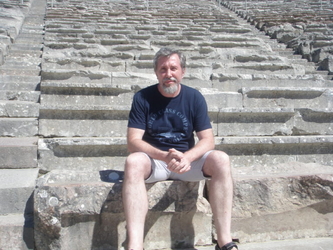 |
| head of the Department of Logic and Methodology of Science | |
| Institute of Philosophy | |
| University of Łódź | |
| 3/5 Lindleya St. | |
| 91-131 Łódź | |
| pokój 321 | |
| ☎ (+42) 635-61-31 | |
| ✉ andrzej.indrzejczak@filhist.uni.lodz.pl |
Curriculum vitae
Education
- 1989: M.A. in Cultural Studies (Faculty of Philology at the University of Łódź)
- 1993: M.A. in Philosophy (Faculty of Philosophy and History at the University of Łódź)
- 1997: Ph.D. in Philosophy (Faculty of Philosophy and History at the University of Łódź)
thesis' title: Sequent- and premise-based formalisations of propositional modal logics (in Polish) - 2007: D.Sc. in Philosophy (Faculty of Philosophy and History at the University of Łódź)
thesis' title: Hybrid deductive systems in modal logics (in Polish) - 2015: Professor of Humanities
Professional experience
- 1992—1997: assistant professor in the Department of Logic and Methodology of Science at the University of Łódź
- 1997—2007: adjunct professor in the Department of Logic and Methodology of Science at the University of Łódź
- 2007—2017: associate professor at the University of Łódź
- 2017—today: full professor at the University of Łódź
- 1999—2007: adjunct professor in the Department of Philosophy at the Higher School of Humanities and Economics in Łódź
- 2007—2014: associate professor at the Higher School of Humanities and Economics (later: Academy of Humanities and Economics) in Łódź
- 2003—2014: logic courses coordinator at the Polish Virtual University
- 2007—2014: head of the Section of General Methodology at the University of Łódź
- 2015—today: head of the Department of Logic and Methodology of Science at the University of Łódź
Courses taught
- introductory, i.a., logic, philosophy, foundations of mathematics
- advanced: Logic II (introduction to non-classical logics), seminars in philosophical logic, Methodology of humanities (doctoral course)
- monographic lectures (i.a., Proof theory, Possible worlds: Introduction to modal logic, Logic and time: Introduction to temporal logic, Reasoning, argumentation, proof, Metalogic)
Interests
Scientific
- Proof theory for non-classical logics, in particular practical applications of proof methods and their combinations (hybrid systems), natural methods of proof search, algorithms and heuristics
- Methodology of sequent calculi: methods of proving cut elimination, extensions onto non-classical logics, antirealistic approach to the meaning of logical constants
- Applications of non-classical logics to formal analysis of traditional philosophical problems, e.g., the analysis of time via temporal logics
- Theory of reasoning and argumentation, classification of arguments, topoi and rhetorical ploys, logical problems with argument assessment (validity and credibility etc.)
- Methodology of social sciences, in particular problems related to text interpretation, analysis of different approaches to scientific foundations of humanities, logical foundations of typology
Other
- Music: I enjoy many different genres, but my favourite are jazz and rock of the 1970s (e.g., Miles Davis, Jimi Hendrix, Weather Report, Chick Corea, Herbie Hancock, Pat Metheny, Carlos Santana, King Crimson)
- Film: for me, Italian cinematography is matchless, especially Federico Fellini, Michelangelo Antonioni, Pier Paolo Pasolini. But the best film of all times is A Clockwork Orange by Stanley Kubrick
- Literature: several good authors worth recommending: Kurt Vonnegut, Philip K. Dick, Ryszard Kapuściński, Stanisław Lem, Jaroslav Hašek, Stephen King
- History of Ancient Greece, Rome and Early Middle Ages; books by Aleksander Krawczuk are still the best way to enter the topic
Publications
Monographs
| 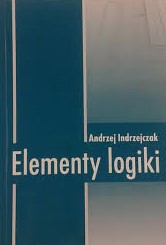 |
| 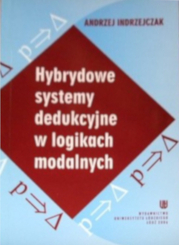 |
|  |
| 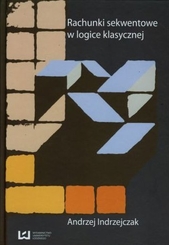 |
| 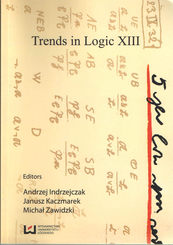 |
|  |
| 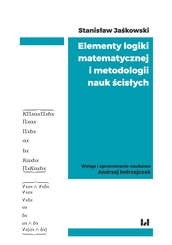 |
| 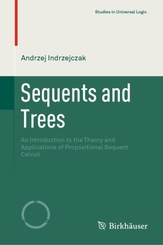 |
Articles in journals and monographs
- Natural Deduction in Quantifier Modal Logic, Bulletin of the Section of Logic, 23(1):30—40, 1994.
- Natural Deduction for Tense Logics, Bulletin of the Section of Logic, 23(4):173—179, 1994.
- A Note Concerning Belief Logic, Bulletin of the Section of Logic, 24(3):169—173, 1995.
- Dedukcja naturalna w logikach modalnych pierwszego rzędu, in: J. Perzanowski, A. Pietruszczak, C. Gorzka (eds), Filozofia logiczna 1994. Materiały I Polskich Warsztatów Logiczno-Filozoficznych, Szklarska Poręba, 25-29 kwietnia 1994 roku, Toruń: Nicolaus Copernicus University Press, 1995, 289—302.
- Cut-free Sequent Calculus for S5, Bulletin of the Section of Logic, 25(2):95—102, 1996.
- Generalised Sequent Calculus for Propositional Modal Logics, Logica Trianguli, 1:15—31, 1997.
- Cut-free Sequent Calculus for S5 (abstract), Bulletin of Symbolic Logic, 3(2), 1997.
- Jaśkowski and Gentzen approaches to Natural Deduction and related systems, in: K. Kijania-Placek, J. Woleński (eds), The Lvov-Warsaw School and Contemporary Philosophy, Dordrecht: Kluver Academic Publishers, 1998, 253—264.
- Cut-free Double Sequent Calculus for S5, Logic Journal of the IGPL, 6(3):505—516, 1998.
- A Survey of Natural Deduction Systems for Modal Logics, Logica Trianguli, 3:55—83, 1999.
- Zagadnienie modalności w logice, Zeszyty Naukowe Wyższej Szkoły Humanistyczno-Ekonomicznej w Łodzi, Logika i filozofia, R. Kleszcz (ed.), 2(7):7—24, 2000.
- Multiple Sequent Calculus for Tense Logics, International Conference on Temporal Logic, Leipzig: University of Leipzig, 2000, 93—104.
- Labelled Analytic Tableaux for S4.3, Bulletin of the Section of Logic, 31(1):15—26, 2002.
- Resolution-based Natural Deduction, Bulletin of the Section of Logic, 31(3):159—170, 2002.
- Hybrid System for (not only) Hybrid Logic, in: P. Balbiani, N.-Y. Suzuki, F. Wolter, M. Zakharyaschev (eds), Advances in Modal Logic 4, London: College Publications, 2002, 132—152.
- Labelled Natural Deduction System for Linear Temporal Logic, Studia Logica, 75(3):345—376, 2003.
- Analityczna procedura dowodzenia twierdzeń w logikach linearnych, in J. Malinowski, A. Pietruszczak (eds), Wokół filozofii logicznej, Toruń: Nicolaus Copernicus University Press, 2004, 35—54.
- Rachunek sekwentów Gentzena w automatycznej ewaluacji testów egzaminacyjnych (co-author: Adam Niewiadomski), Zeszyty Naukowe Wyższej Szkoły Humanistyczno-Ekonomicznej w Łodzi, Zarządzanie informacją, pod red. A Cadera i K. Przybyszewskiego, 5(47):51—58, 2004.
- Wielosekwentowa formalizacja logik temporalnych, in: J. Kaczmarek, R. Kleszcz (eds), Wokół logiki i filozofii, Łódź: Łódź University Press, 2005, 45—61.
- Sequent Calculi for Monotonic Modal Logic, Bulletin of the Section of Logic, 34(3):151—164, 2005.
- Modal Hybrid Logic, Logic and Logical Philosophy, 16(2/3):147—257, 2007.
- Labelled Tableau Calculi for Weak Modal Logics, Bulletin of the Section of Logic, 36(3/4):159—173, 2007.
- Correspondence Theory in Proof Theory, Bulletin of the Section of Logic, 37(3/4): 171—183, 2008.
- Suszko's Contribution to the Theory of Nonaxiomatic Proof Systems, Bulletin of the Section of Logic, 38(3/4):151—161, 2009.
- Uwagi o klasyfikacji rozumowań (Remarks on the classification of reasoning), w: R. Kleszcz (ed.), Widnokrąg analityczny, Łódź: Łódź University Press, 2009, 147—160.
- The Gentzen Sequent Calculus in E-Testing. Part I: Foundations (co-author: Adam Niewiadomski), Journal of Applied Computer Science, 18(1):39—48, 2010.
- The Gentzen Sequent Calculus in E-Testing. Part II: Algorithms and Implementation (co-author: Adam Niewiadomski), Journal of Applied Computer Science, 18(2):57—66, 2010.
- Admissibility of Cut in Congruent Modal Logics, Logic and Logical Philosophy, 20(3):189—203,2011.
- Possible Worlds in Use, Studia Logica, 99: 229—248, 2011.
- Cut-free Hypersequent Calculus for S4.3, Bulletin of the Section of Logic, 41(1/2):89—104, 2012.
- Decision Procedures for some Strong Hybrid Logics (co-author: Michał Zawidzki), Logic and Logical Philosophy, 22(4):389—409, 2013.
- Powstanie i ewolucja dedukcji naturalnej, Filozofia Nauki, 22(2):5—20, 2014.
- Contraction Contracted, Bulletin of the Section of Logic, 43(3/4):139—153, 2014.
- A Survey of Nonstandard Sequent Calculi, Studia Logica, 102(6):1295—1322, 2014.
- Powstanie i ewolucja Rachunków Sekwentowych, Filozofia Nauki, 22(4): 53—70, 2014.
- Eliminability of Cut in Hypersequent Calculi for some Modal Logics of Linear Frames, Information Processing Letters, 115(2):75—81, 2015.
- Natural Deduction, entry in: Internet Encyclopedia of Philosophy, J.-Y. Béziau (ed.), 2015 http://www.iep.utm.edu/nat-ded/.
- Hypersequent Calculi for S5 — The Methods of Cut Elimination (co-author: Kaja Bednarska), Logic and Logical Philosophy, 24(3):277—311, 2015.
- Linear Time in Hypersequent Framework,Bulletin of Symbolic Logic, 22(1):121—144, 2016.
- Uwagi o formach kontrargumentacji (Remarks on the forms of argumentation) (co-author: Beata Promińska), in: J. Maciaszek, R. Kleszcz (eds), Argumentacja, myślenie, działanie, Łódź: Łódź University Press, 2016, 27—40.
- Simple Cut Elimination Proof for Hybrid Logic, Logic and Logical Philosophy, 25(2):129—141, 2016.
- Simple Decision Procedure for S5 in Standard Cut-free Sequent Calculus, Bulletin of the Section of Logic, 45(2):125—140, 2016.
- Tautology Elimination, Cut Elimination and S5, Logic and Logical Philosophy, 26(4):461—471, 2017.
- Cut Elimination Theorem for Non-Commutative Hypersequent Calculus, Bulletin of the Section of Logic, 46(1/2):133—147, 2017.
- Stanisław Jaśkowski: Life and Work, in: Á. Garrido, U. Wybraniec-Skardowska (eds), The Lvov-Warsaw School. Past and Present, Basel: Birkhauser 2018, 457—464.
- Stanisław Jaśkowski and Natural Deduction Systems, in: Á. Garrido & U. Wybraniec-Skardowska (eds), The Lvov-Warsaw School. Past and Present, Basel: Birkhauser 2018, 465—484.
- Cut-free Modal Theory of Definite Descriptions, in: G. Bezhanishvili, G. D'Agostino, G. Metcalfe, T. Studer (eds), Advances in Modal Logic 12, London: College Publications, 2018, 387—406.
- Rule-Generation Theorem and its Applications, Bulletin of the Section of Logic, 47(4):265—281, 2018.
- Fregean Description Theory in Proof-Theoretical Setting, Logic and Logical Philosophy, 28(1):137—155, 2019.
- Two is Enough - Bisequent Calculus for S5, in: A. Herzig & A. Popescu (eds), Frontiers of Combining Systems. 12th International Symposium, FroCoS 2019, London, UK, September 4-6, 2019, Proceedings, Cham: Springer Nature, 2019, 277—294.
- Cut Elimination in Hypersequent Calculus for Some Logics of Linear Time, Review of Symbolic Logic, 12(4):806—822, 2019.
- Existence, Definedness and Definite Descriptions in Hybrid Modal Logic, in: Nicola Olivetti, Rineke Verbrugge, Sara Negri, Gabriel Sandu (eds), Advances in Modal Logic 13, London: College Publications, 2020, 349—368.
- Free Definite Description Theory - Sequent Calculi and Cut Elimination, Logic and Logical Philosophy, 29(4):505—539, 2020.
- O rozumieniu analityczności w teorii dowodu, in: Janusz Maciaszek (ed.), Analiza, racjonalność, filozofia religii. Księga jubileuszowa dedykowana Profesorowi Ryszardowi Kleszczowi, Łódź: Wydawnictwo Uniwersytetu Łódzkiego, 2020, 13—35.
- Free Logics Are Cut-Free, Studia Logica, 109(4): 859—886, 2021.
- A Novel Approach to Equality, Synthese, 199(1—2): 4749—4774, 2021.
- Tableaux for Free Logics with Descriptions (co-author: Michał Zawidzki), in: Anupam Das, Sara Negri (eds), Automated Reasoning with Analytic Tableaux and Related Methods, Cham: Springer, 2021, 56—73.
- Axioms, Hypotheses and Rules. Methodological Considerations, in: Dorota Leszczyńska-Jasion, Paweł Łupkowski, Andrzej Gajda, Szymon Chlebowski (eds), Język, logika, matematyka. Tom dedykowany Jerzemu Pogonowskiemu w siedemdziesięcioletnią rocznicę urodzin, Poznań: Adam Mickiewicz University Press, 2021, 77—96.
- Russellian Definite Description Theory — A Proof-theoretic Approach, The Review of Symbolic Logic, First View, 2021.
- Leśniewski's Ontology — Proof-theoretic Characterization, in: Jasmin Blanchette, Laura Kovács, Dirk Pattinson (eds), Automated Reasoning. 11th International Joint Conference, IJCAR 2022, Cham: Springer, 2022, 541—558.
- Dialogues and Proofs; Yankov’s Contribution to Proof Theory, in: Alex Citkin, Ioannis M. Vandoulakis (eds.), Yankov on Non-Classical Logics, History and Philosophy of Mathematics, Outstanding Contributions to Logic, vol. 24, Cham: Springer, 2022, 53—70.
- When Iota Meets Lambda (co-author: Michał Zawidzki), Synthese, 201: article no. 71, 2023.
- Bisequent Calculus for Four-Valued Quasi-Relevant Logics: Cut Elimination and Interpolation, Journal of Automated Reasoning 67, article no. 37, 2023
- Russellian definite description theory - a proof theoretic approach, Review of Symbolic Logic 16(2), 2023, 624—649.
- Definite Descriptions and Hybrid Tense Logic (co-author: Michał Zawidzki), Synthese, 202: article no. 98, 2023
- A Cut-Free, Sound and Complete Russellian Theory of Definite Descriptions (co-author: Nils Kürbis), in: Revantha Ramanayake, Josef Urban (eds.), Automated Reasoning with Analytic Tableaux and Related Methods, Cham: Springer, 2023, 112—130.
- Towards Proof-Theoretic Formulation of the General Theory of Term-Forming Operators, in: Revantha Ramanayake, Josef Urban (eds.), Automated Reasoning with Analytic Tableaux and Related Methods, Cham: Springer, 2023, 131—149.
- A Uniform Formalisation of Three-Valued Logics in Bisequent Calculus (co-author: Yaroslav Petrukhin), in: Brigitte Pientka, Cesare Tinelli (eds.), Automated Deduction – CADE 29, Cham: Springer 2023, 325—343.
- Gentzen i sekwenty temporalne, in: Dariusz Surowik, Roman Matuszewski, Andrzej Malec (eds), Logika, informatyka, filozofia nauki. W darze Profesorowi Kazimierzowi Trzęsickiemu, Białystok: Uniwersytet w Białymstoku, 161—180.
- SCI–Sequent Calculi, Cut Elimination and Interpolation Property, in: Jacek Malinowski, Rafał Palczewski (eds), Janusz Czelakowski on Logical Consequence, Outstanding Contributions to Logic, vol. 27, Cham: Springer, 2024, 323—343.
- The Logicality of Equality, in: Thomas Piecha, Kai F. Wehmeier (eds.), Peter Schroeder-Heister on Proof-Theoretic Semantics, Outstanding Contributions to Logic, vol. 29, Cham: Springer, 2024, 211—238.
- Gentzen and Temporal Sequents, Studies in Logic, Grammar and Rhetoric, 69(1):241—258, 2024.
- The Problem of Natural Representation of Reasoning in the Lvov-Warsaw School, History and Philosophy of Logic, 45(2):142—160, 2024.
- Uniform Cut-Free Bisequent Calculi for Three-Valued Logics (co-author: Yaroslav Petrukhin), Logic and Logical Philosophy, 33(3):463—506, 2024.
- Bisequent Calculi for Neutral Free Logic with Definite Descriptions (co-author: Yaroslav Petrukhin) [in:] C. Benzmüller, J. Otten, R. Ramanayake (eds), Proceedings of the 5th International Workshop on Automated Reasoning in Quantified Non-Classical Logics (ARQNL 2024), CEUR Workshop Proceedings, vol. 3875, 2024, 48—61.
- When Epsilon meets Lambda: Extended Leśniewski's Ontology [in:] C. Benzmüller, J. Otten, R. Ramanayake (eds), Proceedings of the 5th International Workshop on Automated Reasoning in Quantified Non-Classical Logics (ARQNL 2024), CEUR Workshop Proceedings, vol. 3875, 2024, 62—79.
Edition of journal special issues
- Special issue of Studia Logica, Gentzen's and Jaśkowski's Heritage. 80 Years of Natural Deduction and Sequent Calculi, 102(6), 2014, pp. 1091—1322.
- Special issue of Bulletin of the Section of Logic, Grzegorz Malinowski in Honorem 1, 46(1/2), 2017, pp. 1—150 (co-editor: Janusz Ciuciura).
- Special issue of Bulletin of the Section of Logic, Grzegorz Malinowski in Honorem 2, 46(3/4), 2017, pp. 151—291 (co-editor: Janusz Ciuciura).
- Proceedings of the 10th International Conference on Non-Classical Logics. Theory and Applications, Łódź, Poland, 14-18 March 2022, Electronic Proceedings in Theoretical Computer Science, 358, 2022, pp. 309 (co-editor: Michał Zawidzki).
- Proceedings of the 11th International Conference on Non-Classical Logics. Theory and Applications, Łódź, Poland, 5-8 September 2024, Electronic Proceedings in Theoretical Computer Science, 415, 2024, pp. 270 (co-editor: Michał Zawidzki).
Short papers and extended abstracts
- On the Classification of Natural Deduction Calculi, Proceedings of XXIII World Congress of Philosophy, August 4—10, 2013, Athens 2013, pp. 8.
- Cut-free Hypersequent Calculus for the Basic Temporal Logic of Linear Frames, Short Papers of Advances in Modal Logic 10, Groningen, August 5—8, 2014, Groningen, 2014, 29—33.
- Multiset Union in Sequent Calculi, Short Papers of Trends in Logic XIII, Łódź, July, 2—5, 2014, Łódź 2014, 7—9.
- Hypothetical Reasoning in the setting of Sequent Calculi, Beyond Logic. Proceedings of the Conference held in Cerisy-la-Salle, May 22—27, 2017, J. Fichot, T. Piecha (eds), Tübingen: University of Tübingen, 2017, 413—429.
Online textbooks
- Wstęp do logiki. Materiały do nauczania logiki przez Internet (Introduction to Logic. Materials for Online Logic Courses), Warsaw: Polish Virtual University, 2003.
- Logika i argumentacja. Materiały do nauczania logiki przez Internet (Logic and Argumentation. Materials for Online Logic Courses), Warsaw: Polish Virtual University, 2005.
- Logika i semiotyka. Materiały do nauczania logiki przez Internet (Logic and Semiotics. Materials for Online Logic Courses), Warsaw: Polish Virtual University, 2006.
- Zadania z logiki formalnej (Exercises in Formal Logic), Warsaw: Polish Virtual University, 2008
- Zadania z logiki i semiotyki (Exercises in Logic and Semiotics), Warsaw: Polish Virtual University, 2008
Other
- Kino drugiego stopnia (Second-order cinema), Iluzjon, 36:14—20, 1989.
- Sprawozdanie z konferencji "Logic Colloquium '96, San Sebastian" (Conference Report: "Logic Colloquim '96. San Sebastian"), Ruch Filozoficzny, LIV(1):192—193, 1997.
- Recenzja książki H. Wansinga "Displaying Modal Logic" (Review of Heinrich Wansing's "Displaying Modal Logic"), Zeszyty Naukowe Wyższej Szkoły Humanistyczno-Ekonomicznej w Łodzi, Logika i Filozofia, R. Kleszcz (ed.), 2(7):113—115, 2000.
- Konferencja "Logiki Nieklasyczne — teoria i zastosowania" (próba podsumowania) (The Conference "Non-Classical Logics. Theory and Applications" (Summary)), Ruch Filozoficzny, LXVI(2):335—340, 2009.
Selected conference talks
- 2014, May, 5—10, conference: Applications of Logic in Philosophy and the Foundations of Mathematics XIX, Szklarska Poręba, Poland, talk: Contraction Contracted
- 2014, July, 2—5, conference: Trends in Logic XIII, Łódź, Poland, talk: Multiset Union in Sequent Calculi
- 2014, August, 5—8, conference: Advances in Modal Logic 10, Groningen, Netherlands, talk: Cut-free Hypersequent Calculus for the Basic Temporal Logic of Linear Frames
- 2014, August, 23—24, conference: Hypothetical Reasoning, Tübingen, Germany, invited lecture: Hypersequents and Linear Time
- 2014, October, 21—22, conference: 60th Conference of the History of Logic, Cracow, Poland, talk: 80 Years of Natural Deduction (in Polish: 80 lat dedukcji naturalnej)
- 2015, May, 4—8, conference: Applications of Logic in Philosophy and the Foundations of Mathematics XX, Szklarska Poręba, Poland, talk: A Survey of Hypersequent Calculi for S5 (jointly with Kaja Bednarska)
- 2015, June, 20—30, conference: 5th World Congress and School on Universal Logic, Istanbul, Turkey, 3 1-hour invited lectures Cut Elimination Theorem:
1. Sequent Calculi and Cut Rule
2. Methods and Strategies of Cut Elimination
3. Consequences, Applications, Extensions and Limitations of Cut Elimination - 2015, September, 15—19, conference: 10th Polish Philosophical Congress, Poznań, Poland, talk: Hypersequent Formalisation of Linear Temporal Logics (in Polish: Hipersekwentowa formalizacja logik czasu liniowego)
- 2015, September, 24—25, conference: Non-classical Logics. Theory and applications VII, Toruń, Poland, talk: Cut Elimination Theorem for Hybrid Logics
- 2016, May, 4—8, conference: Applications of Logic in Philosophy and the Foundations of Mathematics XXI, Szklarska Poręba, Poland, talk: Tautology Elimination Rule
- 2016, September, 5—7, conference: Non-classical Logics. Theory and applications VIII, Łódź, 2 talks:
1. Tautology Elimination Theorem for Fitting's Formalization of S5
2. Cut Elimination in Noncommutative Hypersequent Calculus for Temporal Logics - 2016, October, 24—26, conference: 62nd Conference of the History of Logic, Cracow, Poland, talk: Wykłady Jaśkowskiego. Pierwszy podręcznik dedukcji naturalnej (Jaśkowski's Lectures. First Textbook of Natural Deduction)
- 2017, February, 4, A session dedicated to Professor Ewa Orłowska celebrating the 60th anniversary of her scientific work, invited lecture: Identity in Dual Tableaux (in Polish: Ujęcie identyczności w systemach tablic dualnych)
- 2017, May, 8—12, conference: Applications of Logic in Philosophy and the Foundations of Mathematics XXII, Szklarska Poręba, Poland, talk: Elimination of Cut in Non-commutative Hypersequent Calculus for Temporal Logic
- 2017, May, 22—27, conference: Beyond Logic, Cerisy-la-Salle, France, invited lecture: Hypothetical Reasoning in the Setting of Sequent Calculi
- 2017, November, 10—11, conference: Research Workshop on Hybrid Intensional Logic, Salamanca, Spain, invited lecture: Cut Elimination Theorem for Hybrid Modal Logics
- 2018, January, 20, Session organised by the Polish Association for Logic and Philosophy of Science, invited lecture: Sekwentowe podejście do modalnej teorii deskrypcji (Sequent-based Approach to Modal Theory of Descriptions)
- 2018, May, 7—11, conference: Applications of Logic in Philosophy and the Foundations of Mathematics XXIII, Szklarska Poręba, Poland, 2-part invited lecture Definite Descriptions and Proof Theory
Part 1: Russel's and Fregean theories of Definite Descriptions
Part 2: Sequent Calculus and Cut Elimination - 2018, June, 16—20, conference: 6th Universal Logic School, Vichy, France, 3-part invited lecture Definite Descriptions in the Proof-theoretic Setting:
Part 1: A Survey of the Basic Approaches to Definite Descriptions
Part 2: Proof-Theoretic Toolkit
Part 3: Modal Theories of Definite Descriptions - 2018, June, 21—26, conference: 6th World Congress on Universal Logic, Vichy, France, talk: Stanisław Jaśkowski and the First Textbook based on Natural Deduction
- 2018, June, 30—July, 2, conference: Philosophers' Rally 2018, Łódź, Poland, invited lecture: Beyond Logic — Recent Directions in Proof Theory
- 2018, August, 27—31, conference: Advances in Modal Logic, Bern, Switzerland, talk: Cut-free Modal Theory of Definite Descriptions
- 2018, September, 24—25, conference: Non-classical Logics. Theory and applications IX, Toruń, Poland, invited lecture: Stanisław Jaśkowski and Natural Deduction
- 2019, January, 14, event: 1st World Day of Logic, Łódź, Poland, talk: Kurt Gödel, życie i logika (Kurt Gödel, life and logic)
- 2019, February, 19, event: Seminar Session in the Institute of Advanced Studies, London, UK, lecture: How to provide a decent proof system for definite descriptions
- 2019, March, 27—30, conference: Proof-theoretic Semantics: Assesment and Future Perspectives III, Tübingen, Germany, invited lecture: Proof-theoretic Approach to Definite Descriptions
- 2019, April, 6—7, conference: A gdzie logika?, Łódź, Poland, invited lecture: Logika w Nauce (Logic in Science)
- 2019, May, 13—17, conference: Applications of Logic in Philosophy and the Foundations of Mathematics XXIV, Szklarska Poręba, Poland, talk: Completing the Circle - Cut Admissibility for Carnielli-style n-Sequent Calculus.
- 2019, June, 19—21, conference: Smirnov Readings in Logic XI, Moscow, Russia, invited lecture: Cut-free Sequent Calculi for Some Theories of Definite Descriptions.
- 2019, August, 11—15, conference: Logic Colloquium, Prague, Czech Republic, talk: Admissibility of Cut for Sequent Calculus Related to n-labelled Tableaux.
- 2019, September, 3—6, conference: Frontiers of Combining Systems (FroCoS), London, UK, talk: Two is enough - bisequent calculus for S5.
- 2019, September, 9—14, conference: The 11th Polish Philosophical Congress, Lublin, Poland, panel: Inspiracje do tworzenia nowych systemów logicznych (Motivation for Devising New Logical Systems), talk: Rachunki bisekwentowe w zastosowaniu do logik nieklasycznych (Bi-sequent Calculi for Non-Classical Logics).
- 2020, March, 9—15, conference: Applications of Algebra in Logic and Comuter Science XXIV, Zakopane, Poland 2-part invited lecture: Logicality of Equality; Proof-Theoretic Considerations.
- 2020, August 24—28, conference: Advances in Modal Logic, Helsinki, Finland (online), talk: Existence, Definedness and Definite Descriptions in Hybrid Modal Logic
- 2020, November 3—4, conference: 66th Conference of the History of Logic, Cracow, Poland (online), talk: Ontologia Leśniewskiego w teoriodowodowym ujęciu (Leśniewski's Ontology in Proof-theoretic Setting)
- 2020, November, 11—13, conference: 11th Łódź Philosophical Workshop, Łódź, Poland (online), invited lecture: «Nieskończoność unieskończoniona» Georga Cantora (1845-1918) (Georg Cantor's «Infinite infinity»)
- 2021, June 24—26, conference: Smirnov Readings in Logic XII, Moscow, Russia (online), invited lecture: Leśniewski's Ontology — Proof-Theoretic Characterization
- 2021, June 24—26, conference: Smirnov Readings in Logic XII, Moscow, Russia (online), talk: On the application of bisequents to many-valued logics (co-author: Yaroslav Petrukhin)
- 2021, July 2—3, conference: 1st Łódź-Bochum Workshop, Łódź, Poland, Bochum, Germany (online), talk: When iota meets lambda
- 2021, September 6—9, conference: International Conference on Automated Reasoning with Analytic Tableaux and Related Methods, Birmingham, United Kingdom (online), talk: Tableaux for Free Logics with Descriptions. (co-author: Michał Zawidzki)
- 2021, November 3—4, conference: 67th Conference of the History of Logic, Cracow, Poland (online), talk: Three-valued logics in bisequent framework (co-author: Yaroslav Petrukhin)
- 2022, April 1—11, conference: 7th World Congress and School on Universal Logic, Crete, Greece, 3-part tutorial: Equality. Proof-Theoretic Considerations
- 2022, April 1—11, conference: 7th World Congress and School on Universal Logic, Crete, Greece, invited lecture: Hybrid Logic and Applications": A Survey of Proof Systems for Hybrid Logics
- 2022, July 22—23, conference: 2nd Workshop on Relating Logic, Cagliari, Italy, talk: Relating Logics — Cut-Free Formalization and the Interpolation Theorem
- 2022, August 8—10, conference: 11th International Joint Conference on Automated Reasoning — IJCAR 2022, Haifa, Israel, talk: Leśniewski's Ontology — Proof-Theoretic Characterization
- 2022, August 11, conference: iPRA 2022 — the 4th Workshop on Interpolation: From Proofs to Applications, Haifa, Israel, talk: When iota meets lambda (co-author: Michał Zawidzki)
- 2022, September 5—8, conference: The Sixth World Congress of Paraconsistency in Toruń (WCP6) — The Second Stanisław Jaśkowski Memorial Symposium, Toruń, Poland, 2-part tutorial: On Jaśkowski's Heritage (co-author: Marek Nasieniewski)
- 2022, September 5—8, conference: The Sixth World Congress of Paraconsistency in Toruń (WCP6) — The Second Stanisław Jaśkowski Memorial Symposium, Toruń, Poland, talk: Bisequent calculi for paraconsistent three-valued logics (co-author: Yaroslav Petrukhin)
- 2022, November 17—18, conference: 2nd Łódź-Bochum Workshop, Bochum, Germany, talk: The coming to terms project: Extending proof theory by ι
- 2023, May 8–12, conference: Applications of Logic in Philosophy and the Foundations of Mathematics XXVI, Szklarska Poręba, Poland, talk: Towards a General Proof Theory of Term-Forming Operator
- 2023, June 28–30, conference: Cracow Logic Conference (CLoCk), Cracow, Poland, talk: Proof-theoretic formulation of Quinean set theory NF
- 2023, July 1–4, conference: 29th Conference on Automated Deduction (CADE-29), Rome, Italy, talk: A Uniform Formalisation of Three-Valued Logics in Bisequent Calculus (co-author: Yaroslav Petrukhin)
- 2023, September 11–16, conference: 12th Polish Congress of Philosophy, Łódź, Poland, talk: Prezentacja wyników wypracowanych do tej pory w ramach projektu ”Coming to Terms: Proof Theory Extended to Definite Descriptions and other Terms”
- 2023, September 11–16, conference: 12th Polish Congress of Philosophy, Łódź, Poland, talk: Predicate Abstracts and Definite Descriptions (co-author: Michał Zawidzki)
- 2023, September 11–16, conference: 12th Polish Congress of Philosophy, Łódź, Poland, talk: A Uniform Formalisation of Three-Valued Logics in Bisequent Calculus (co-author: Yaroslav Petrukhin)
- 2023, September 18–21, conference: 32nd International Conference on Automated Reasoning with Analytic Tableaux and Related Methods (TABLEAUX 2023), Prague, Czech Republic, talk: A cut-free, sound and complete Russellian theory of definite descriptions (co-author: Nils Kürbis)
- 2023, September 18–21, conference: 32nd International Conference on Automated Reasoning with Analytic Tableaux and Related Methods (TABLEAUX 2023), Prague, Czech Republic, talk: Towards Proof-Theoretic Formulation of the General Theory of Term-Forming Operators
- 2023, November 22–25, conference: Trends in Logic XXIII. Bridges between Logic, Ethics and Social Sciences (BLESS). 70 years of Studia Logica, Toruń, Poland, talk: Anselm’s God and theories of definite descriptions
- 2024, March 4–6, conference: The Sixth Asian Workshop on Philosophical Logic (AWPL 2024), Sapporo, Japan, talk: Leśniewski's Ontology Satisfies Interpolation
- 2024, March 7, conference: Sapporo One-day Workshop on Hybrid Logic and Proof Theory, Sapporo, Japan, talk: Hybrid Logic Extended with Lambda and Iota Operators
- 2024, March 9, conference: LLAL@GSIS (II), Sendai, Japonia, talk: Application of Bisequent Calculus to Neutral Free Logic with Definite Descriptions (co-author: Yaroslav Petrukhin)
- 2024, May 6–10, conference: Applications of Logic in Philosophy and the Foundations of Mathematics XXVII, Szklarska Poręba, Poland, talk: Bisequent Calculi for Neutral Free Logic with Definite Descriptions (co-author: Yaroslav Petrukhin)
- 2024, May 6–10, conference: Applications of Logic in Philosophy and the Foundations of Mathematics XXVII, Szklarska Poręba, Poland, talk: When Epsilon Meets Lambda: Extended Leśniewski's Ontology
- 2024, May 16–18, conference: Formal Methods and Science in Philosophy V, Dubrovnik, Croatia, talk: Russell, Definite Descriptions and Anselm’s God: Approaches to Concepts
- 2024, May 16–18, conference: Formal Methods and Science in Philosophy V, Dubrovnik, Croatia, talk: Bisequent Calculi of Definite Descriptions in Neutral Free Logic (co-author: Yaroslav Petrukhin)
- 2024, May 27–28, conference: Czech Gathering of Logicians 2024 and Kurt Gödel Day 2024, Brno, Czech Republic, talk: Proof Systems for Hybrid Logic with Lambda and Iota Operators
- 2024, June 24–28, conferenece: Logic Colloquium 2024, Gothenburg, Sweden, 2024,talk: Do theories of definite descriptions support Anselm's God?
- 2024, July 1, conference: 5th International Workshop on Automated Reasoning in Quantified Non-Classical Logics (ARQNL 2024) (associated with IJCAR 2024), Nancy, France, talk: Bisequent Calculi for Neutral Free Logic with Definite Descriptions (co-author: Yaroslav Petrukhin)
- 2024, July 1, conference: 5th International Workshop on Automated Reasoning in Quantified Non-Classical Logics (ARQNL 2024) (associated with IJCAR 2024), Nancy, France, talk: When Epsilon meets Lambda: Extended Leśniewski's Ontology
- 2024, August 18–23, event: Proof Representations: From Theory to Applications, Dagstuhl Seminar 24341, Dagstuhl, Germany, talk: Proof Theory extended to definite description & other terms
- 2024, September 5–8, conference: Non-Classical Logics. Theory and Applications XI (NCL'24), Łódź, Poland, talk: Sequent Calculi for Logics of Classes
- 2024, September 5–8, conference: Non-Classical Logics. Theory and Applications XI (NCL'24), Łódź, Poland, talk: Bisequent Calculi for Neutral Free Logic with Definite Descriptions (co-author: Yaroslav Petrukhin)
- 2025, January 10, event: Seminar of the Institute of Cybernetics of the Estonian Academy of Sciences, Tallin, Estonia, talk: Proof Systems for Extensions of Hybrid Logic with Complex Terms
- 2025, January 11, event: World Logic Day 2025 in Tallin, Estonia, talk: Bisequent Calculus and its Applications to Non-Classical Logics
Research projects
- 80 Years of Natural Deduction and Sequent Calculus
- Principal investigator: Andrzej Indrzejczak
- Duration of the project: 7th August 2012—6th December 2014
- Grant number: 2011/03/B/HS1/04366
- Funding body: National Science Centre, Poland
- Call: OPUS 2
- Amount: 106 530 PLN
- Sequent- and Tableau-based Proof Systems for Nonclassical Logics
- Principal Investigator: Andrzej Indrzejczak
- Duration of the project: 15th January 2018—14th January 2023
- Grant number: 2017/25/B/HS1/01268
- Funding body: National Science Centre, Poland
- Call: OPUS 13
- Amount: 364 680 PLN
- Project team: dr Michał Zawidzki (investigator), Yaroslav Petrukhin, MA (PhD student)
- Project description: Applications of non-classical logics of different sort in computer science, cognitive science, artificial intelligence and other areas are common nowadays. One cannot even imagine today's life without using various devices which are strongly based on theoretical solutions developed in the framework of various nonclassical logics. Some of them, like modal logics or higher order logics, simply extend classical logic, whereas other, like linear logic, fuzzy, or relevant logics, modify significantly its properties. In particular, modal logics deserve special attention due to their usefulness. The aim of the project is the investigation of some important proof systems for nonclassical logics. We will focus on sequent and tableau calculi in standard and generalised form, and their application to widely understood modal logics. Both sequent and tableau calculi are one of the most interesting proof systems applied in proof theoretical research and in automated deduction. Modal logics form a wide class of important extensions of classical logics which are extensively applied to formalize temporal, epistemic, deontic and many other notions. In particular we are going:
1. To develop some new proof systems and compare their behaviour with other known solutions. In particular, we focus on the generalised version of sequent calculus called hypersequent calculus and on labelled tableau systems.
2. To study different methods of proving essential features of sequent and tableau calculi which facilitate actual practice of proof. These include methods of proving admissibility of cut rule and termination of proof search.
- Coming to Terms: Proof Theory Extended to Definite Descriptions and other Terms (ExtenDD)
- Principal investigator: Andrzej Indrzejczak
- Duration of the project: 1 October 2022—30 September 2027
- Grant number: 101054714
- Funding body: European Research Council
- Call: Advanced Grant 2021
- Amount: 1 629 775 EUR
- Project team: dr Nils Kürbis (investigator), dr Przemysław Wałęga (post-doc), dr Michał Zawidzki (post-doc), Yaroslav Petrukhin, MA (PhD student/post-doc)
- Project description: The project is concerned with two areas which so far have rarely come together: complex terms and proof theory. ExtenDD focuses on definite descriptions as the most important and troublesome singular terms and on sequent calculus and its generalizations as the most important tool of modern proof theory. Since Russell's 'On Denoting', regarded as a paradigm of analytic philosophy, definite descriptions occupy a central place in philosophical research and many deep and detailed studies have been carried out. The second half of the 20th century saw the development of new approaches to this phenomenon based on non-classical logics, in particular free logic in which, contrary to Frege's and Russell's classical logic, it is not assumed that every term refers. Yet despite the long history of research into definite descriptions, a paradigm of formal logic has so far rarely been applied to them: proof theory. The methods developed by Gentzen, in particular those relating to his sequent calculus, provide the means for the deepest study of proofs and their properties. Yet only a small effort has so far been put into the adequate treatment of definite descriptions in this framework. The same counts for other complex singular terms such as set abstracts and number operators. ExtenDD fills this important gap in research. Applying the methods of proof theory to definite descriptions is profitable to both sides. Competing theories of definite descriptions and complex terms in general, their advantages and shortcomings, are shown in a new light. The behaviour of complex terms needssubtle syntactical analysis and requires enriching the toolkit of proof theory. ExtenDD deals with both challenges: it develops formal theories of definite descriptions and modifies the machinery of proof theory to cover new areas of application. The realization of ExtenDD affects significantly the field of proof theory, automated deduction and philosophy of language.
- Project website: https://uni.lodz.pl/extendd
Other activities
Organizing committees of conferences
- Non-Classical Logics. Theory and Applications
- I: 2008, September, 4—6, Łódź, Poland
- II: 2009, September, 17—19, Łódź, Poland
- III: 2010, September, 16—18, Toruń, Poland
- IV: 2011, September, 27—29, Łódź, Poland
- V: 2012, September, 27—29, Toruń, Poland
- VI: 2013, September, 4—6, Łódź, Poland
- VII: 2015, September, 24—26, Toruń, Poland
- VIII: 2016, September, 5—7, Łódź, Poland
- IX: 2018, September, 24—27, Toruń, Poland
- X: 2022, March, 14—18, Łódź, Poland
- XI: 2024, September, 5—8, Łódź, Poland
- Trends in Logic XIII, 2014, July, 2—5, Łódź, Poland
- University — Philosophy as the Foundation of Knowledge, Action and Ethos, 2015, June, 11—13, Łódź, Poland (program committee)
Editorial boards of journals and series
- Bulletin of the Section of Logic
Editor-in-Chief - Studia Logica
The Chairman of the Editorial Board - Trends in Logic. Studia Logica Library (Springer)
Member of the Editorial Board
Reviewing for journals
- Archive for Mathematical Logic
- Bulletin of the Section of Logic
- Erkentniss
- European Journal for Philosophy of Science
- Filozofia Nauki
- Information and Computation
- Journal of Applied Non-Classical Logics
- Journal of Automated Reasoning
- Journal of Logic and Computation
- Journal of Philosophical Logic
- Logic and Logical Philosophy
- Logic Journal of the IGPL
- Logica Universalis
- Logique et Analyse
- Notre Dame Journal of Formal Logic
- Reports on Mathematical Logic
- The Review of Symbolic Logic
- Studia Logica
- Synthese
- Theoretical Computer Science
Teaching materials (mainly in Polish)
- Hybrid systems and logics: hybrid systems (Pol.), deductive systems (Pol.), formalisations of modal logics (Pol.)
- Logic II (introduction to modal logics): introduction (Pol.), modal logics (Pol.), temporal logics (Pol.), first-order modal logics (Pol.), intuitionistic logic (Pol.), multi-valued logics (Pol.), lecture notes (Pol.)
- Logic and time — introduction to temporal logics: lecture notes (Pol.)
- Metalogic: mathematical induction / axiomatic systems, completeness of CPL (Pol.), basic sequent calculus (Pol.), extended sequent calculus (Pol.)
- Methodology of humanities: science (Pol.), conceptual framework (Pol.), explanation (Pol.), description (lecture notes) (Pol.), explanation (lecture notes) (Pol.), interpretation (lecture notes) (Pol.), reasoning and argumentation 1 (lecture notes) (Pol.), reasoning and argumentation 2 (lecture notes) (Pol.), conceptual framework (lecture notes) (Pol.), conceptual framework 2 (lecture notes) (Pol.), questions (lecture notes) (Pol.)
- Modal hybrid logics: lecture notes
- Possible worlds — introduction to modal logics: lecture notes (Pol.), appendix (Pol.)
- Sequent calculus for weak modal logics: lecture notes
- Reasoning, argumentation, proof: reasoning (Pol.), arguments (Pol.), proofs (Pol.), algorithms (Pol.)
- Introduction to sequent calculus: sequent calculi (Pol.), cut elimination theorems (Pol.), lecture notes (Pol.)
